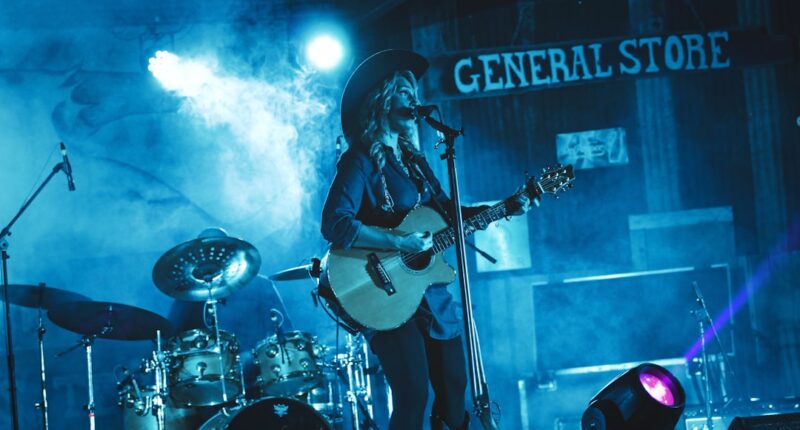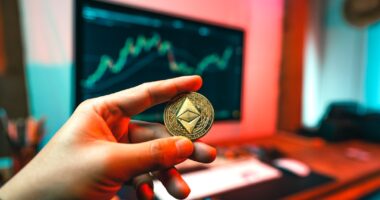The advent of Non-Fungible Tokens (NFTs) has ushered in a new era in various sectors, with the music industry being one of the most significantly impacted. NFTs are unique digital assets that represent ownership or proof of authenticity of a specific item, often linked to digital art, music, or collectibles. Unlike cryptocurrencies such as Bitcoin or Ethereum, which are fungible and can be exchanged for one another, NFTs are distinct and cannot be replicated.
This uniqueness has made them particularly appealing to artists and creators looking to monetize their work in innovative ways. As the music industry grapples with the challenges of digital piracy and declining physical sales, NFTs offer a fresh avenue for revenue generation and fan engagement. Global Music Awards, which celebrate artistic excellence in the music industry, have begun to explore the integration of NFTs into their frameworks.
These awards not only recognize outstanding achievements but also serve as a platform for artists to gain visibility and connect with their audiences. The intersection of NFTs and music awards presents a fascinating opportunity to redefine how artists are recognized and rewarded. By leveraging blockchain technology, these awards can enhance transparency, provide new revenue streams, and create unique experiences for fans.
As we delve deeper into this topic, it becomes evident that NFTs are not merely a passing trend but a transformative force reshaping the landscape of music recognition and appreciation.
Key Takeaways
- NFTs are non-fungible tokens that are revolutionizing the way music is bought, sold, and awarded at the Global Music Awards.
- NFTs are changing the music industry by providing artists with new revenue streams and opportunities for fan engagement.
- The rise of NFTs in music awards has led to a shift in how awards are distributed and recognized within the industry.
- NFTs are impacting music award categories by allowing for unique and exclusive digital assets to be awarded to winners.
- NFTs are influencing the music award voting and selection process by providing a transparent and secure platform for fans and industry professionals to participate.
NFTs Revolutionizing the Music Industry
Revolutionizing the Music Industry with NFTs
The music industry has long struggled to adapt to the digital age. The rise of streaming services has disrupted traditional revenue models, resulting in a decline in album sales and artist royalties. However, NFTs have emerged as a game-changing tool that allows musicians to regain control over their work.
Direct-to-Consumer Model and Increased Profit Margins
By minting their music as NFTs, artists can sell their songs, albums, or even concert tickets directly to fans without intermediaries. This direct-to-consumer model not only increases profit margins for artists but also fosters a deeper connection between creators and their audience. Moreover, NFTs enable musicians to offer exclusive content and experiences that were previously unattainable.
Exclusive Content and Enhanced Fan Experience
For instance, an artist might release a limited edition NFT that grants the owner access to behind-the-scenes footage, private concerts, or even one-on-one virtual meet-and-greets. This level of exclusivity not only enhances fan loyalty but also creates a sense of community among supporters. The ability to own a piece of an artist’s work in a verifiable manner adds intrinsic value to the fan experience, transforming passive listeners into active participants in an artist’s journey.
The Rise of NFTs in Music Awards

As the music industry continues to embrace NFTs, music awards are beginning to incorporate these digital assets into their ceremonies and recognition processes. The integration of NFTs into music awards is not merely a gimmick; it represents a fundamental shift in how accolades are distributed and celebrated. For example, some award shows have started offering NFT trophies that winners can showcase digitally.
These trophies can be designed with unique artwork or even embedded with exclusive content related to the winning artist’s work. Additionally, the use of NFTs in music awards allows for innovative voting mechanisms. Fans can purchase NFTs that represent votes for their favorite artists or songs, creating a more engaging and participatory experience. This approach not only democratizes the voting process but also incentivizes fans to invest in their favorite artists’ success.
As more award shows adopt this model, it is likely that we will see an increase in fan-driven initiatives that celebrate musical talent in diverse ways.
NFTs Impact on Music Award Categories
| Award Category | Impact of NFTs |
|---|---|
| Album of the Year | Potential for album NFTs to offer exclusive content and experiences to fans |
| Song of the Year | NFTs can be used to release limited edition digital artwork or music related to the winning song |
| Best New Artist | NFTs can provide a new revenue stream for emerging artists through digital art or collectibles |
| Record of the Year | NFTs can offer unique digital collectibles related to the winning record |
The introduction of NFTs into music awards has the potential to redefine existing award categories and create entirely new ones. Traditional categories such as “Best Album” or “Best New Artist” may evolve to include distinctions for NFT-related achievements. For instance, awards could be established specifically for the best-selling NFT album or the most innovative use of NFTs in marketing an artist’s work.
This shift would not only recognize the growing importance of digital assets in the music landscape but also encourage artists to explore new creative avenues. Furthermore, the categorization of awards could become more nuanced as artists experiment with different formats and distribution methods. For example, an artist who releases a series of singles as NFTs might be recognized for their innovative approach rather than being confined to traditional album-based categories.
This flexibility allows for a broader range of artistic expression and acknowledges the diverse ways in which music is consumed in the digital age.
NFTs Influence on Music Award Voting and Selection Process
The traditional voting process for music awards has often been criticized for its lack of transparency and inclusivity. However, the integration of NFTs offers a solution that could enhance both aspects significantly. By allowing fans to purchase NFT votes, award shows can create a more transparent system where each vote is verifiable on the blockchain.
This transparency not only builds trust among fans but also ensures that the voting process is fair and accountable. Moreover, this new voting mechanism can empower fans by giving them a tangible stake in the outcome of the awards. Fans who invest in NFT votes may feel more connected to the artists they support, leading to increased engagement and enthusiasm around award ceremonies.
Additionally, this model could attract new audiences who are interested in both music and blockchain technology, further expanding the reach and relevance of music awards in contemporary culture.
NFTs and the Global Music Awards Revenue Model

The financial implications of integrating NFTs into global music awards are profound. Traditional revenue models for award shows often rely on sponsorships, ticket sales, and advertising revenue. However, by incorporating NFTs into their frameworks, these awards can tap into new revenue streams that align with current trends in digital ownership and collectibles.
For instance, award shows could sell limited edition NFT memorabilia related to nominees or winners, creating an additional layer of monetization. Furthermore, NFT sales can provide ongoing revenue through royalties each time an NFT is resold on secondary markets. This means that artists and award shows can continue to benefit financially from successful NFT releases long after the initial sale.
As more fans become interested in collecting digital assets associated with their favorite artists or award shows, this model could lead to significant financial growth for both parties involved.
Challenges and Opportunities of NFTs in Global Music Awards
While the integration of NFTs into global music awards presents numerous opportunities, it is not without its challenges. One significant hurdle is the environmental impact associated with blockchain technology, particularly those that rely on energy-intensive proof-of-work systems. Critics argue that the carbon footprint of minting and trading NFTs undermines their potential benefits.
As awareness of climate change grows, award shows must consider sustainable alternatives or offsetting strategies to mitigate their environmental impact. Additionally, there is a learning curve associated with adopting NFT technology for both artists and award organizers. Many musicians may lack familiarity with blockchain concepts or how to effectively market their NFTs.
To address this challenge, educational initiatives could be implemented to help artists navigate this new landscape successfully. Workshops or partnerships with tech companies specializing in blockchain could empower musicians to leverage NFTs effectively while maximizing their creative potential.
Future Outlook: NFTs and the Evolution of Global Music Awards
Looking ahead, it is clear that NFTs will play an increasingly prominent role in shaping the future of global music awards. As technology continues to evolve, we can expect more innovative uses of NFTs that enhance fan engagement and redefine how artists are recognized within the industry. The potential for virtual reality experiences tied to NFT ownership could revolutionize how fans interact with award shows, allowing them to immerse themselves in unique environments celebrating their favorite artists.
Moreover, as more artists embrace blockchain technology and explore its possibilities, we may witness a shift toward decentralized award systems where fans have greater influence over nominations and winners. This democratization could lead to a more diverse representation of musical talent across genres and regions, ultimately enriching the cultural landscape of global music awards. In conclusion, while challenges remain on the horizon, the integration of NFTs into global music awards signifies a transformative moment for both artists and fans alike.
The potential for innovation is vast, paving the way for a future where recognition in the music industry is more inclusive, transparent, and aligned with contemporary digital practices. As we continue to explore this intersection between technology and artistry, it becomes evident that NFTs are not just a fleeting trend but rather a catalyst for meaningful change within the global music ecosystem.
In exploring the potential impact of NFTs on global music awards by 2025, it’s essential to consider the broader context of blockchain technology in the music industry. A related article that delves into this topic is available on ETH News, which discusses how blockchain, the underlying technology behind NFTs, is revolutionizing music rights management and artist compensation. This insightful piece provides a comprehensive overview of the current trends and future possibilities, making it a must-read for anyone interested in the intersection of blockchain technology and the music industry. You can read the full article by visiting this link.
FAQs
What are NFTs?
NFTs, or non-fungible tokens, are a type of digital asset that represent ownership or proof of authenticity of a unique item or piece of content using blockchain technology.
How do NFTs relate to music awards?
NFTs have the potential to revolutionize the way music awards are distributed and experienced. They can be used to create unique digital collectibles for award winners, provide exclusive access to content or events, and offer new ways for fans to engage with their favorite artists.
How might NFTs influence global music awards by 2025?
By 2025, NFTs could be integrated into the music awards process to provide a more secure and transparent way of tracking ownership and distribution of awards. They could also be used to create new revenue streams for artists and award shows through the sale of digital collectibles and exclusive content.
What are the potential benefits of using NFTs in music awards?
Using NFTs in music awards could provide greater transparency and security in the distribution of awards, create new opportunities for artists to monetize their work, and offer fans unique and exclusive experiences related to their favorite artists and award shows.
What are some potential challenges or drawbacks of using NFTs in music awards?
Challenges of using NFTs in music awards could include the environmental impact of blockchain technology, the potential for fraud or misuse of NFTs, and the need for education and infrastructure to support widespread adoption.





